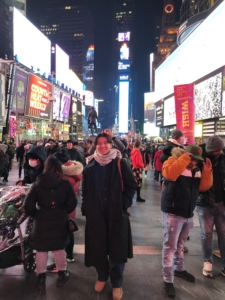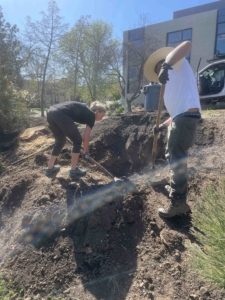SOU receives passport grant – student applications open through June 7
Southern Oregon University has been selected by the Institute of International Education (IIE) to receive an IIE American Passport Project grant that will pay for as many as 25 SOU students to obtain U.S. passports.
IIE’s American Passport Project is a key initiative under the institute’s Center for Access and Equity, and demonstrates the organization’s commitment to create more equitable access to study abroad opportunities. The program prioritizes first-year students receiving Pell grants – for whom this may be their first passport – in order to remove a barrier to future study abroad participation.
Adult passports currently cost $130, plus a $35 execution fee at the passport facility.
“While $165 may not be a large amount compared to other costs associated with study abroad, like plane tickets, students without a passport and with limited financial resources are often hesitant to spend that money until they know they absolutely need it,” said SOU Education Abroad advisor Ariel Bloomer.
That certainty may come too late, and result in a missed opportunity. Routine processing of passports currently takes 10 to 13 weeks. Many international programs will not be able to process an official acceptance until the student’s passport information is received, and then students may need to account for a student visa process that could take another two to 12 weeks, depending on the destination.
“Removing this barrier is as much about timing as it is about the cost,” Bloomer said. “We want students to be able to say ‘yes’ to international opportunities when they arise, and not have a lengthy administrative process waylay them.”
To apply for the IIE American Passport Project Scholarship, students should check their eligibility and fill out the brief application on Scholarship Universe by June 7. Student nominations will then be confirmed with the Institute of International Education.
All applicants will receive information on the passport application process from the Office of International Programs, which also operates as a Passport Acceptance Facility serving students and the community Wednesdays and Thursdays from 1 to 4 p.m. Selected students will be able to take passport photos and complete their passport application all on campus with the support of International Programs staff.
IIE awarded passport funds to 48 institutions in the IIENetwork this year, including both Southern Oregon University and Oregon State University, which will help up to 1,200 students across the country obtain passports. IIE aims to reach 10,000 U.S. students by 2030 through the IIE American Passport Project, with the overall goal of increasing diversity and inclusion of students studying abroad.
“A passport is the first thing that opens up their world to the possibility of study abroad,” said Courtney Temple, IIE Executive Vice President and Chief Administrative Officer.
Current or future students who want to learn more about studying abroad while at SOU can explore the International Programs web page, the Outdoor Adventure Leadership international expeditions page, or read about recent faculty-led programs such as Criminology in Ireland.
Story by Ariel Bloomer, SOU Education Abroad advisor





 The most striking cultural clash for Aiki has been experiencing American individualistic culture, as the foreign frame of mind comes off as abrasive. The self-importance that seems ingrained in American culture has been a confounding adjustment for Aiki. Social behaviors in the U.S. that have stood out to him are that people are friendly here, yet they distance themselves from others and make it clear that other people are “not their problem,” he says, and people are not nearly as consumed with their own agendas back home.
The most striking cultural clash for Aiki has been experiencing American individualistic culture, as the foreign frame of mind comes off as abrasive. The self-importance that seems ingrained in American culture has been a confounding adjustment for Aiki. Social behaviors in the U.S. that have stood out to him are that people are friendly here, yet they distance themselves from others and make it clear that other people are “not their problem,” he says, and people are not nearly as consumed with their own agendas back home.


 The trees and shrubs planted on Arbor Day were purchased from the local Shooting Star Nursery and Plant Oregon, and included several native varieties, including pollinator plants.
The trees and shrubs planted on Arbor Day were purchased from the local Shooting Star Nursery and Plant Oregon, and included several native varieties, including pollinator plants.